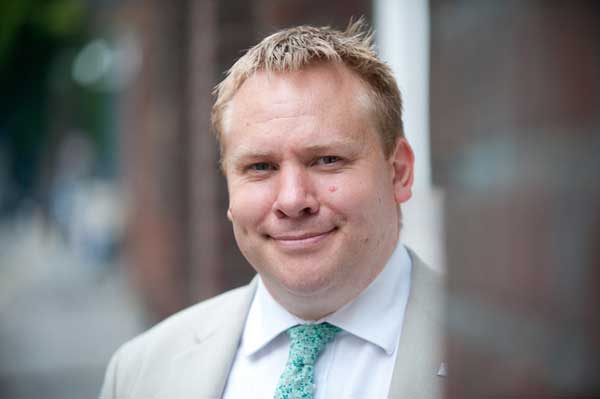Action on Hearing Loss, like most charities, is facing a tough budget squeeze. But managing director of corporate resources Paul Breckell tells PF it’s important that disabled people do not end up bearing the brunt of the austerity drive
 Times are tough for third sector organisations – especially for those that rely heavily on public funding. More than 2,000 charities and community groups face budget cuts as local authorities reduce or even completely withdraw their funding, according to research by anti-cuts organisation False Economy.
Times are tough for third sector organisations – especially for those that rely heavily on public funding. More than 2,000 charities and community groups face budget cuts as local authorities reduce or even completely withdraw their funding, according to research by anti-cuts organisation False Economy.The research, based on Freedom of Information responses from councils across England, shows that charities can expect net funding reductions of more than £110m this year. The final figure is likely to be even higher since some large councils have yet to decide where the axe will fall.
Action on Hearing Loss is among many disability-related charities that are feeling the pinch. Formerly known as the Royal National Institute for Deaf People, it has a staff of more than 1,000 and a turnover of £45m. Around 45% of its income comes from public sources.
The charity’s activities include advising people on how to look after their hearing, funding research into hearing loss and campaigning on behalf of the people it supports. It provides a variety of services, ranging from adult social care for profoundly deaf people with additional needs to community-based services for those with mild hearing loss. In addition, it sells products such as doorbells that flash, rather than make a noise, and -listening devices that amplify sounds. It is this area that has been most badly hit by public sector austerity measures.
Paul Breckell, the charity’s managing director of corporate resources, says: ‘In relation to delivering services on behalf of local authorities, our experience has been that while there is understandable pressure on pricing and for us to be as efficient as possible, the demand hasn’t gone away.
‘What’s more challenging is where in the past there has been more discretionary spending on products and services. Our turnover in terms of product sales to the public sector is significantly down year on year.’
In fact, sales in the first quarter of this year fell by 25%. Breckell is confident that the charity can manage this but is concerned that people with disabilities will bear a disproportionate part of the austerity burden because they do not have a voice in local or national decision-making. ‘The key for us is to make sure that the 10 million people in the UK who have got some degree of hearing loss, particularly the half million people considered to be profoundly deaf, get a fair deal in these challenging times,’ he says.
One area where they are getting a raw deal is job opportunities. With unemployment high across the UK and employment support funds for people with disabilities declining, it is becoming harder to get people with hearing loss back into work. Yet withdrawing the support that would enable many of them to be economically active can end up as the more expensive option, according to Breckell. ‘So we are trying to keep a close eye on the holistic economic impact of what is going on.’
Breckell says he has always wanted to work in organisations that support people in difficult circumstances. He began his career at the Audit Commission and qualified with CIPFA while working there as a senior auditor.
After almost five years with the commission, he left to manage the finance team at Mildmay, an HIV/AIDS charity with centres in east London and Kampala, Uganda. That eventually led to a job with the much larger Church Mission Society where, at the age of just 28, he was appointed finance director – and found himself on a steep learning curve in a role covering IT, property and pensions, as well as finance.
Eight years later, the prospect of taking on an even broader range of responsibilities attracted him to what was then the RNID. The corporate resources group that he has headed for the past four years covers finance, strategy, information systems, property, risk, legal services and people issues, including HR and organisational development. It also includes responsibility for volunteers, an increasingly important area for charities in the context of austerity and the government’s Big Society programme.
Action on Hearing Loss has around 1,200 volunteers but is aiming for a ratio of five to each member of staff, which would bring the total to 5,000. Breckell says volunteers can add value in many ways, not least by improving the quality of service users’ lives. But he is concerned that in the current climate there is a risk that they will be used to replace, rather than enhance, statutory services.
A related danger, he says, is that over the next few years the value that charities bring to society will be measured in terms of how much money they save the public purse, rather than the difference they make to the people and causes they serve.
Breckell, who chairs CIPFA’s voluntary sector panel, believes this means that charities will need to do more to demonstrate the impact they make.
His own organisation, which recently celebrated its centenary, produced its first impact report 12 years ago and is continuing to develop the way it measures and demonstrates the effects of its work. So, for example, rather than simply reporting that it provides social care to a certain number of people each year, the charity also looks at what this means for service users’ personal finance, health and general wellbeing.
Breckell is well aware of the dangers facing charities at this time. ‘There is obviously a knock-on effect from public sector austerity on the voluntary sector, and I’m sure that is at the top of the FD’s list in pretty much any charity,’ he says.
But he also sees some grounds for cautious optimism. He points out that the Big Society has opened up opportunities for the third sector to provide services both to local authorities and, in England, to the NHS under the ‘any qualified provider’ framework.
‘What’s really important in terms of good service delivery with public money is to make sure that contractual relationships are positive, transaction costs are kept as low as possible and accountability lines remain in place,’ he says. However, he warns that relationships could become needlessly adversarial in the context of austerity.
‘A lot of transactional costs go into adversarial relationships between clients and contractors,’ he adds.
‘So whatever we can do to make sure that the public sector appreciates and understands where the voluntary sector is coming from – and vice versa – the better.’
Curriculum Vitae
2007-present
Managing director of corporate resources, Action on Hearing Loss
2004 - 2006
Director of finance and corporate services, Church Mission Society
1991 - 2004
Head of finance, Mildmay
1987 -1991
Senior auditor, the Audit Commission



















